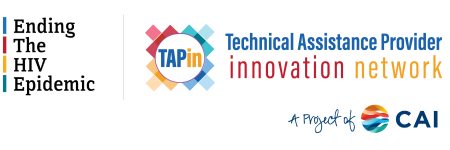Join the TAP-in: Technical Assistance Provider-innovation network for upcoming webinars, or view recent archived webinars.Webinars are held on an ongoing basis and are generally archived and available online within a few weeks. TAP-in collaborates with the EHE Systems Coordination Provider (NASTAD).
Components
- This webinar discusses evidence-based interventions for meth users, as well as community and other programs that are focused on the needs of black, gay, bisexual, same-gender-loving men with HIV who use meth and how to optimize HIV treatment outcomes while reducing harm and stigma.
- This webinar discusses the importance of digital marketing to help advance programmatic goals for ending the HIV epidemic.
Housing First is an effective, cost-efficient, evidence-based best practice that demonstrates improved health outcomes and care utilization for people experiencing homelessness, including people wi
- Insights from rapid start sites, determined from an environmental scan, virtual field visits, and jurisdictions participating in the learning community.
- How to create comprehensive Cluster Detection and Response (CDR) programs as part of Ending the HIV Epidemic activities.
- Review of how to integrate services using a syndemic approach in order to collectively address HIV, STIs, viral hepatitis, and substance use disorders.
- Review of the efficacy of LAIs and implementation activities undertaken by agencies.
- Kickoff of a national campaign to showcase how RWHAP leaders have been innovating to achieve the goal of ending the HIV epidemic.
- Effective models and best practices for connection to care for justice-involved individuals.
- Review of the concept of status-neutral and examples of real-world applications from jurisdiction peers and leaders.
- Review of building data partnerships with agencies that manage and control access to data, which can support planning and evaluation of EHE activities.
- Review of the epidemiology of methamphetamine as it relates to HIV, the psychodynamics of meth use, and implications for EHE efforts.
- Implementation model to integrate trauma informed care into agency operations.
- Collaboration among Eds and others to implement routine HIV, HCV, and syphilis screening to increase identification and reduce time to treatment.
- Review of innovative Rapid ART strategies in diverse settings.
- Review of the role federally qualified health centers play in the care of people who are uninsured and medically underserved, including people with HIV.
- Tips on linking to the best data sources and helping the EHE team integrate data management into implementation activities.
- Overview of HIV housing strategies and program models with a focus on innovation and on leveraging of housing and supportive services.
- Strategies to engage hard-to-reach youth and young adults through use of social media and related technologies.
- Review of the impact of SUDs on HIV outcomes and effective evidence-based SUD interventions (Medication Assisted Treatment, Motivational Interviewing, and Contingency Management).
- Panel discussion of how agencies can adjust telehealth services, often developed rapidly in response to COVID-19, in a post-pandemic environment.
- The use of performance measures to help achieve EHE plan goals.
- Model approaches for community partner engagement and coordination to support interventions for the mitigation of HIV outbreaks.
- Insights for entities seeking to create or strengthen rapid ART.
This resource was developed by
Technical Assistance Provider Innovation Network (TAP-in)
